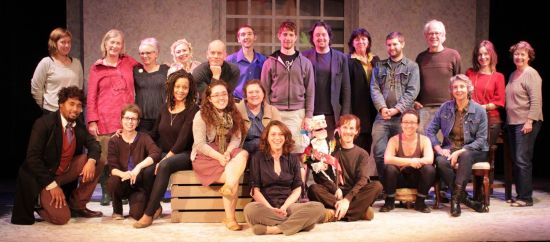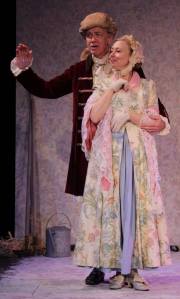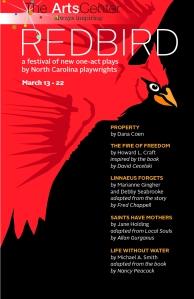The Carrboro ArtsCenter has generally been a key player in the local theatre scene since its founding in 1974, and has been fortunate in its leaders, from Mary Ruth through Derrick Ivey and Emily Ranii. But Jeri Lynn Schulke, current artistic director of ArtsCenter Stage, has particularly championed–and commissioned–new work for the stage since taking that position. March 13 saw the first blossoming of her most strenuous effort yet, made in collaboration with, and major support from, Dorrie Casey. Casey is one of those protean artists who explore every aspect–she’s acted, sung, written, directed, designed and criticized–and now dreamed up and co-produced a festival of new one-act plays by North Carolinians. The Schulke-Casey team commissioned the plays and put together a dream team of about 30 theatre artists to present five works in two programs. This is community theatre, but not volunteer. Every one working on this is getting paid. “Not a living wage, said Casey, “but a respectful amount of money.” The first three of these new works debuted on the 13th; the second two will premiere tonight.
The Triangle is rich in theatre. Both the university-based and the independent theaters do amazing work year in, year out. But the REDBIRD festival strikes me as marking a significant step forward in our cultural growth. The world has long praised North Carolina writers, and this (first?) festival capitalizes on the well-known names of some of them–four of the five plays are adaptations from other forms. On opening night, all the authors and playwrights were in the house, if not on the stage.
First up on Program One is Jane Holding’s adaptation of Allan Gurganus’ Saints Have Mothers, from his novella collection Local Souls, performed by her with her customary entrancing blend of bold and bashful. Her intoxicating speaking voice, cultivated by reading aloud since childhood, glides from character to character as Holding tells a complicated story of a thwarted poet’s love for her daughter and the predicaments in which it lands her. Nothing can take the Southern out of that voice, though it knows many variants. Like most of Gurganus’ characters, Jean is eccentric, wacky with energies seeking outlets, and very very talkative, but never “derange-o” as some kids in the mall call her. After a deeply traumatic and ridiculous series of events (don’t want to spoil the surprise for those who haven’t read the story), Jean’s on the ferry to Ocracoke, having been instructed to “gather” herself and get out of everyone’s hair. Director Tamara Kissane (mother of a daughter herself) has created a pleasing amount of action for this extended monologue. She has Jean bump and struggle up the steps to the ferry’s upper deck with much luggage, where she takes over two benches in the sun, pulling things out of her many totes and shopping bags to illustrate her tale, and makes the story close with the ferry’s arrival in harbor, so that Jean clatters and bumps her awkward way offstage into the next chapter. She’s lightened her load by an item or two. Very smart.
Gurganus’ grand, wry style, both embroidered and cut to the quick, gets to its destinations via many diversionary paths and lacunae, but never loses sight of the operatic human feelings that inform it. Holding “made many passes” over the story, successfully condensing it to its most telling and dramatic elements for the stage, without altering the tempo so important to Gurganus’ storytelling. Both the original and the adaptation make you hoot with laughter, cringe sometimes, and sometimes cry–but the in stage version, Jean’s pain, anger, relief and mystification are more directly communicated and felt.
The program’s second work, Linnaeus Forgets, was adapted from a Fred Chappell short story of the same title by Marianne Gingher and Debby Seabrooke, and is absolutely delightful. It takes quite a few liberties with the original, but Chappell laughed and nodded and shook his head in amazement from the front row during the performance. Gingher and Seabrooke have made some of the story into songs (some original music by Sam Gingher), wonderfully sung by Greg Hohn in period costume and wig, and made other parts into puppetry, and substituted a fabulous claymation video sequence for description of what Linnaeus sees through his magnifying glass. The two beautifully caught Chappell’s blend of erudition and simplicity; his love for the fantastical and the ordinary (sex and love fall into both categories), and his deep sympathy for his characters. They even made up rhymes that sound like Fred Chappell rhymes–“no, no,” Chappell said afterwards, chuckling, “those weren’t mine, those were all Marianne’s.”
Greg Hohn also directs, and he keeps the pace zesty and the laughs coming. Jimmy Magoo operates and speaks for a marvelous puppet, and he might speak a little more loudly, but that was the only problem. Tom Marriott is completely wonderful as the aged, dreaming scientist, and most charming waltzing with his wife (Lenore Field), still a coquette after all the years. Special kudos to the costume designer, Marissa Erickson.
Tom Marriott also directs the program’s final work, perhaps its most difficult and ambitious. Michael A. Smith has made a first-rate adaptation of Nancy Peacock’s 1996 novel, Life Without Water, set in 1969-1975, mostly in a Chatham County that time has nearly erased. It’s a good moment to revisit this story. Maybe if we look back carefully enough on the Vietnam war, we might find someway out of the morass of war we’re sinking in now. Life Without Water is a small book that contains an outsized story, and I didn’t see how it could be squeezed into a one-act play with a small number of characters.
But Smith, with, I believe, some ideas from director Marriott, conceived a simple set-up in which daughter Cedar (Jane Allen Wilson, kinetic and commanding) tells her story, with her mother Sara (Marcia Edmundson, softly aged, still baffled by the buffeting events) there to agree, augment, argue and echo. Marcia Edmundson can evoke big emotions with the most economical of gestures, and her little shiftings and turnings away at difficult moments had me stifling sobs at times. The house so crucial to the story, Two Moons, is present in an excellent changing photo/video backdrop made by photographer Catharine Carter and video designer Joseph Amodei. That this is Cedar’s story, and Sara’s in it, is made clear by Cedar controlling the laptop on stage that controls the images. Brilliant. There’s also great period-appropriate sound design by Tom Guild, and again, Erickson’s costuming is strong: she’s put mother and daughter both in the dark red of placental blood. It was very hard to keep in mind that they weren’t actually mother and daughter, so natural–free and easy–with each other are the actors, and so well-timed is the direction.

Marcia Edmundson as Sara, Two Moons, and Jane Allen Wilson as Cedar, in Life Without Water. Photo courtesy the ArtsCenter.
That three quite different plays could appear smoothly on the same stage during the same evening, in a modest theater with minimum backstage facilities and a tiny control booth, speaks of the high levels of skill and organization that have gone into making this festival. There were no delays; there were no technical problems. Just three hours of exhilarating, artful theatre. Made in North Carolina, on view in the Paris of the Piedmont.
For the remaining schedule and to purchase tickets, go here.
Oh, little red bird come to my window sill
Been so lonesome, shaking that morning chill
Oh, little red bird open your mouth and say
Been so lonesome, just about flown awaySo long now I’ve been out
In the rain and snow
But winter’s come and gone
A little bird told me soFrom “Winter’s Come and Gone” by Gillian Welch and David Rawlings.



